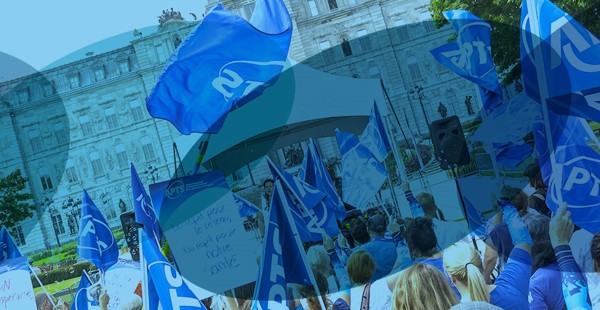Asbestos found in rooms of the Montréal West Island CIUSSS | A ceiling collapsed, narrowly missing an employee, and no action has been taken in a year!
July 25, 2024

Montréal – During a visit by the joint health and safety committee (CPSST), the APTS (Alliance du personnel professionnel et technique de la santé et des services sociaux) learned – to the employer’s great displeasure – of an astonishing series of events. In June 2023, a ceiling collapsed at 6 Weredale Park, with an employee barely escaping injury. While the room where the disaster occurred (L310) was closed off, nothing was done until June 2024, when a CNESST inspector determined there was a health and safety hazard for the people working on the floor in question because of the presence of asbestos in deteriorating materials and dust likely to contain asbestos, and that an evacuation should be done. But the employer didn’t think it important to inform the people working in the building.
A shocking combination of negligence and concealment
A firm was hired a few days after the collapse, and it confirmed the presence of asbestos in the ceiling materials on that floor. It recommended asbestos disposal work and a complete restoration of the ceiling in rooms 310 and 314, using a “high-risk asbestos” work procedure, in addition to a visual inspection of the entire floor to determine whether other interventions should be given priority. Nothing was done. Worse still, when there was water infiltration on the 3rd floor from the roof in November 2023, nothing was done to remove the wet materials, even though the New York Protocol recommends that work be done within 48 hours to avoid increased health risks. “The amount of negligence is mind-boggling!” said Josée Asselin, the APTS provincial representative for the Montréal West Island CIUSSS. “We’re talking about asbestos here. It’s common knowledge that it’s toxic and can cause serious respiratory disease, including cancer.”
In addition to this blatant recklessness, there were repeated attempts to cover up what was happening. “The employer’s representatives were aware of the situation and tried to hide it,” said Josée Asselin. “This was apparent when managers told their employees they could safely return to pack up their possessions after some rooms were finally closed off at the end of May 2024, when this was evidently not the case. Clearly, the risks of asbestos had not been communicated at a number of levels.” The employer waited until June 26, 2024 to notify employees working in the building of their potential exposure to asbestos. Yesterday, they finally met with a nurse and two occupational hygienists from the Regional Directorate of Public Health for Montréal who informed them of the risks they had been exposed to. This is in addition to the significant stress suffered by workers, who feel particularly powerless given the prolonged uncertainty.
What the APTS expects
Transparency, proactivity and accountability: Josée Asselin will settle for nothing less from the Montréal West Island CIUSSS. The APTS will be closely tracking the issue and ensure that no work is done at the site until the CNESST has confirmed it is safe. She also expects the asbestos registry – which hasn’t been updated since 2007 – to be updated every two years, in compliance with the Regulation respecting occupational health and safety. Lastly, the APTS believes it is time for accountability and is studying the recourse available to shed light on the employer’s actions. “It’s unacceptable that people behaved so irresponsibly and secretively when the health and safety of dozens of workers were potentially at risk,” the provincial representative said. “Our members and their colleagues can’t go through all this just to have it happen again. An example must be made.”
The APTS
The APTS (Alliance du personnel professionnel et technique de la santé et des services sociaux) represents more than 65,000 members, including over 2,500 on the West Island of Montréal, who play a key role in ensuring that health and social services institutions run smoothly. Our members provide a wide range of services for all Quebecers, including diagnostic, rehabilitation, nutrition, psychosocial intervention, clinical support, and prevention services.

